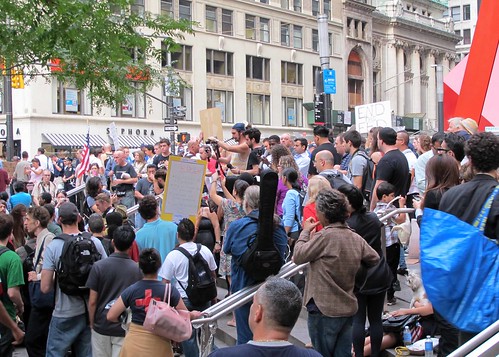Law
is a reflection our values as a society. It sets the parameters within which our conduct must conform and provides redress for
individuals who have been harmed by those who step outside of these
boundaries. It is, in many ways, the great equalizer that can
transcend disparities in wealth and status.
While essential legal principles, most of which are codified in our Constitution and international legal instruments, are unwavering, much of our law is fluid. Legal protections and restrictions change. There has been and will always be debate as to the proper role of law in certain areas of life, and what the goals of many of our laws should be. For example, the phrase “All Men Are Created Equal” initially excluded women and African Americans. Although the underlying principle remains the same, the class of persons included has expanded as our societal values have changed. A vibrant public dialogue on the law created this and similar evolutions, and must continue in order to foster the ideas that will help us progress as a nation.
While essential legal principles, most of which are codified in our Constitution and international legal instruments, are unwavering, much of our law is fluid. Legal protections and restrictions change. There has been and will always be debate as to the proper role of law in certain areas of life, and what the goals of many of our laws should be. For example, the phrase “All Men Are Created Equal” initially excluded women and African Americans. Although the underlying principle remains the same, the class of persons included has expanded as our societal values have changed. A vibrant public dialogue on the law created this and similar evolutions, and must continue in order to foster the ideas that will help us progress as a nation.
Professors,
practitioners and students of law engage in extraordinary legal
discussions through academic journals, conferences and symposia.
Through these venues they highlight problems, advocate changes, and
seek new conceptualizations of the law. They put forth the ideas that
are vital to understanding and improving the legal system. Most
people, however, don't know this dialogue is taking place, much less
can participate in it. Legal professionals engage in debates, but
only with other legal professionals. As a recent law school graduate
and new attorney, even I find it hard to access these venues due to
the considerable amount of time and money they require. There is a
culture of exclusion that keeps legal knowledge out of the hands of
ordinary citizens and denies them the opportunity to participate in
important legal debates.
At
this moment in our history, the public debate about law and the
Constitution is just as fervent as the one within the legal
community. Yet the public's knowledge of basic legal concepts is
inadequate for such a discussion. Amidst a contentious debate about
rights, liberties and constitutional principles, how many people
actually know what the state action doctrine is and how it affects
the applicability of the Constitution? We, as a country, are having a
discussion about the role of regulation and its effects on men, women
and juridical “persons.” Should we not know about corporate
personhood, or be guided by the salient quote from Chief Justice John
Marshall that “[t]he government of the United States has been
emphatically termed a government of laws, and not of men.”1
When we speak of states' rights, should we not know about the
Supremacy Clause and federal preemption in
addition to
the 10th Amendment? Is there anyone who doesn't think that these
concepts should be common knowledge? Why, in the midst of such an
intense debate over legal principles, are fundamental doctrines
virtually unknown, and academic works on these subjects unavailable,
to the public?
Legal professionals should take steps to democratize legal knowledge. Law is a fundamental part of our national dialogue. But to enrich the debate, Americans must have a greater understanding of the law. Legal institutions (bar associations, law schools, law firms, etc.) and practitioners should open up the debate and make greater efforts to both educate the public and increase the accessibility of legal academic work. Adherence to the law is not a luxury. Nor should knowledge about our rights and duties under the law be. By increasing the public's understanding, we have the potential to not only demystify the law, but create a better-informed public and more robust dialogue about the proper role of law in society.
Legal professionals should take steps to democratize legal knowledge. Law is a fundamental part of our national dialogue. But to enrich the debate, Americans must have a greater understanding of the law. Legal institutions (bar associations, law schools, law firms, etc.) and practitioners should open up the debate and make greater efforts to both educate the public and increase the accessibility of legal academic work. Adherence to the law is not a luxury. Nor should knowledge about our rights and duties under the law be. By increasing the public's understanding, we have the potential to not only demystify the law, but create a better-informed public and more robust dialogue about the proper role of law in society.
1 Marbury
v. Madison, 5 U.S. 137, 163 (1803).

